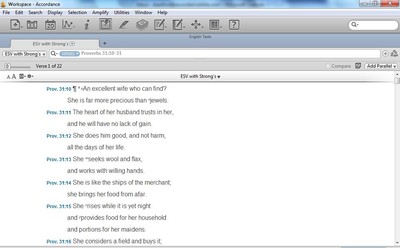Only heaven knows how many articles, lectures, sermons, books, seminars, women’s Bible studies, and retreats have extolled the virtues of the Wonder Woman described in the last page of the book of Proverbs.
So, was Proverbs 31 originally written for women to read and study? The answer seems obvious. Yes. Of course. Who else would it have been written for?
A review of various volumes in my Accordance 12 Library offers two unexpected answers.
The first surprise? This particular passage of Scripture doesn’t always appear at the end of Proverbs. Sometimes it appears six or eight chapters earlier.
The second surprise? Like the rest of Proverbs, it was originally written as a challenge to young men of standing within an ancient patriarchal kingdom.
Granted, it may be tempting for some younger men today to read Proverbs 31:10-31 rather flippantly — “Wow, if only I had a wife like this” — without stopping to notice what this passage says about the other main character, the Good Husband.
First, the Good Husband recognizes the true value of his wife as a person (31:10). He sees her as priceless. “She is far more precious than jewels.”
Second, the Good Husband believes in the great potential of his wife (31:11). He encourages her to be productive and fulfilled both in and out of the home. “The heart of her husband trusts in her, and he will have no lack of gain” (see also 31:12-25).
Third, the Good Husband realizes the importance of listening to and learning from the wisdom of his wife (31:26). “She opens her mouth with wisdom, and the teaching of kindness is on her tongue,” and her faithfulness is obvious to all within her large and prosperous household (31:27-28a).
Finally, the Good Husband praises the virtues and accomplishments of his wife (31:28b-29). He doesn’t flatter her, but praises his wife for her fear of God (31:30) and her successful endeavors (31:31). “Give her of the fruit of her hands, and let her works praise her in the gates.”


